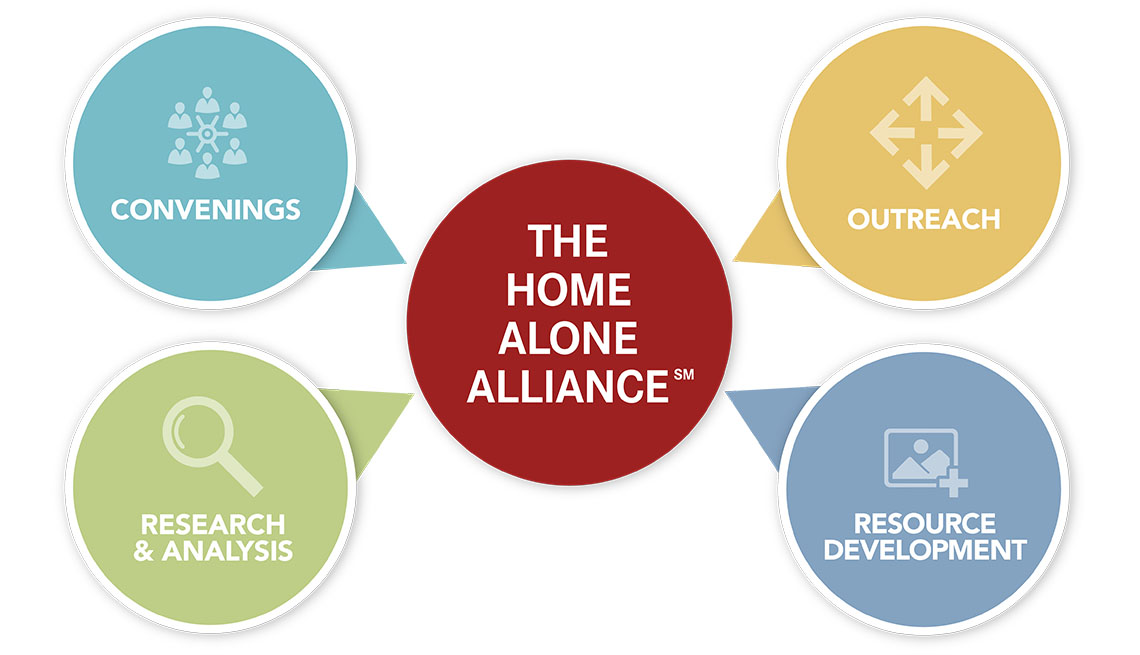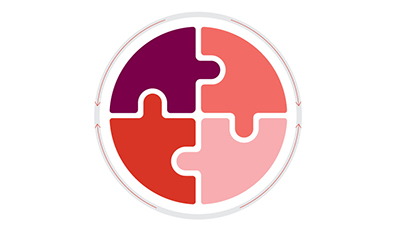Pathways to Care: Experiences with Long-Term Services and Supports in Illinois
This qualitative report summarizes the issues Illinois caregivers and older adults faced finding local LTSS resources and their assessments of the quality of care accessed, supplemented by the first-person comments and observations of the interviewees. Read.
Nursing Home Workforce Issues and Inequities
This Spotlight examines nursing home worker issues, including low wages and benefits and lack of career advancement opportunities. Read.
Addressing Racial and Ethnic Disparities in Nursing Homes
This Spotlight explores the history of racial and ethnic inequities in nursing homes, discusses trends in nursing home admissions by race and ethnicity, and proposes recommendations for change. Read.
National Inventory of Self-Directed Long-Term Services and Supports Programs
The National Inventory of Self‑Directed Long-Term Services and Supports Programs builds upon the 2023 LTSS State Scorecard and previous inventories and provides an overview of all publicly funded self-directed LTSS nationwide. Read.
Respite Services: A Critical Support for Family CaregiversA
This paper explores respite, are provided to an older adult or person with disabilities so that their family caregiver can get a short break from their care responsibilities, its impact on family caregivers, and barriers to its use. Read.
A Closer Look at Sandwich Generation Caregivers of Medicare Beneficiaries
This report uses qualitative and quantitative data to depict sandwich generation caregivers to Medicare beneficiaries and the care they provide. Read.
Advancing Racial and Ethnic Equity in Long-Term Services and Supports
This issue brief highlights research on inequities in LTSS related to the Scorecard’s five domains. This paper further outlines potential data sources to assess these inequities and discusses implications for how AARP plans to address these inequities through the Scorecard. Read.
Expanding ADU Development and Occupancy: Solutions for Removing Local Barriers to ADU Construction
This guide is intended to help community leaders, planners, and housing practitioners and advocates identify and overcome specific challenges that limit the local supply and legal occupancy of ADUs. Read.
Valuing the Invaluable 2023 Update: Strengthening Supports for Family Caregivers
This report pulls from multiple sources to profile who family caregivers are and the challenges they face and includes several first-person accounts of the experience. Read
CAPABLE: A Model of Empowering Older Adults to Remain Independent
This paper highlights the Community Aging in Place—Advancing Better Living for Elders (CAPABLE) model, designed to keep older adults in the community and to improve their ability to remain independent. Read
High-Performance Revisited: Examining Long-Term Services and Supports System Performance
Each edition of the Long-Term Services and Supports (LTSS) State Scorecard has measured and ranked LTSS systems in every state against an objective, data-driven set of metrics, or indicators. In advance of the forthcoming 2023 edition, a new paper discusses our approach and reflects on what has changed since the Scorecard was first published. Read
LTSS Choices: From Ideation to Standard Practice: Scaling Innovations in Long-Term Services and Supports
Five promising innovations currently in the long-term services and supports (LTSS) system are becoming more commonplace. This paper discusses these innovative programs and the diffusion of innovation, or scaling-up process, underlying them. Read
LTSS Choices: Increasing Independent Living Choices through Coordinating Affordable Housing and Medicaid: Housing as an Indicator in the 2020 Long-Term Services and Supports State Scorecard
This paper highlights how three states have addressed concerns about housing and services for Medicaid and state-funded LTSS beneficiaries by linking affordable housing properties with LTSS and other supportive services. Read
LTSS Choices: Coordinating Housing, Health and LTSS Through Home-Based Care Management
This report describes and evaluates the SASH (Support and Services at Home) program in Vermont as one model of HBCM programs. Founded in 2009, SASH now partners with 70 organizations, including hospitals, community-based organizations, and academic institutions in sites across the state. Read
Family Caregiver Considerations for the Future of Hospital at Home Programs
The declaration of the COVID-19 public health emergency (PHE) accelerated an already burgeoning movement of health care into the home. An increasing number of health care systems are choosing to invest in homebased care in new and innovative ways, and consumers are using these services at unprecedented levels. The Hospital at Home (HaH) model shifts care into the home setting and delivers acute hospital-level care to eligible patients where they live instead of in a hospital. Read
LTSS Choices: Empowered Direct Care Worker: Lessons from the Green House Staffing Model
This paper describes the most widely researched model in the small-house nursing homes category: THE GREEN HOUSE®. Authors discuss how the Green House staffing model improves the quality of work life for staff and promotes positive outcomes for residents and whether any of these tactics can be adopted by nursing homes that are not yet able to change their housing structures. Read
LTSS Choices: International Review of Experts’ Recommendations for Reforming the Long-Term Services and Supports Workforce
This report describes the LTSS workforce in the Organisation for Economic Cooperation and Development (OECD), of which the United States is a member country. It reviews the challenges LTSS workers face, summarizes experts’ recommendations for reform, and offers examples from some OECD countries that are innovating to improve the situation for their LTSS workforce. Read
LTSS Choices: Promoting Choices through Restorative Services: International Innovations
This report highlights a multidisciplinary intervention that strengthens a person’s ability to function called restorative services (sometimes called reablement or restorative care). It explores the evidence of the impact of restorative services and reviews roughly 20 years of evidence related to the efficacy of these services by summarizing international and country-specific studies. It concludes with recommendations for policy makers. Read
LTSS Choices: The Role of Medicaid Managed Long-Term Services and Supports during the COVID-19 Pandemic
This report examines the role played by Medicaid managed care organizations (MCOs) delivering Medicaid managed long-term services and supports (MLTSS) during the pandemic, including some of the “on-the-ground” experiences of MCOs and other stakeholders as the crisis unfolded. We explore the challenges states and MCOs faced, efforts to meet the needs of recipients of MLTSS, and lessons learned. Read
LTSS Choices: International Review of Innovations to Protect Nursing Home Residents from Infectious Diseases such as COVID-19
This report reviews the international community’s experience with the COVID-19 pandemic in nursing homes, focusing on the experiences of some countries that have had relatively few deaths in their residential care facilities: how they prepare for pandemics in general, how they responded to the pandemic and how their long-term care infrastructure improved outcomes. It also covers international experts’ recommendations for improving how nursing homes and assisted living facilities respond to infectious disease. Read
LTSS Choices: Presumptive Eligibility for Medicaid Home and Community-Based Services Can Expand Consumer Choice
This report explores how presumptive eligibility can empower consumers to access publicly funded home- and community-based services (HCBS) without lengthy determination delays. Read
LTSS Choices: Paying Family Caregivers to Provide Care during the Pandemic-and Beyond
Medicaid is the primary funder of long-term services and supports (LTSS) in the United States. It provides those services and supports either through institutional care (i.e., nursing home care) or home- and community-based services (HCBS). This report explains that one cost-effective HCBS option with multiple advantages is to pay family members to provide care for older people and adults with physical disabilities. Read
Caring Locally for Caregivers: How State and Local Laws Protect Family Caregivers from Discrimination
Workplace discrimination against employees who care for adult family members, called Family Responsibilities Discrimination (FRD) or caregiver discrimination, is an escalating problem that can disadvantage employees and put employers at legal risk. This report details the ways in which state and local laws fill in the gaps left by federal law by prohibiting employment discrimination that occurs because of family caregiving. Read
Managing a Paid Job and Family Caregiving is a Growing Reality
The 2020 Caregiving in the U.S. report revealed an increase of more than 5 million employed family caregivers since 2015. This report takes a deeper look into the Caregiving in the US data at the nearly 30 million Americans who are caring for an ill friend or family member while also working at a paying job. It highlights the impacts and challenges of managing both responsibilities, and it identifies what’s changed since 2015. Read
Caregiving in the United States 2020
Just released by The National Alliance for Caregiving (NAC) and AARP: Caregiving in the U.S. 2020. This 2020 update reveals an increase in the number of family caregivers in the United States of 9.5 million from 2015 to 2020.
Family caregivers now encompass more than one in five Americans. The study also reveals that family caregivers are in worse health compared to five years ago. As the demand for caregiving rises with an aging population, there is an opportunity for the public and private sectors to work together to develop solutions to support family caregivers and those under their care. Read
Recognition of Family Caregivers in Managed Long-Term Services and Supports
Based on a study of managed long-term services and supports (MLTSS) programs, this report examines provisions in MLTSS contracts that are important for the support of family caregivers. The study comprised the review of 31 MLTSS programs for older adults and adults with physical disabilities in 23 states in 2019. Read
Fast-tracking Approval for Publicly Funded LTSS: Presumptive Eligibility
Part of the Long-Term Services & Supports State Scorecard Promising Practices, this paper examines Presumptive Eligibility programs in five states -- Michigan, Ohio, Rhode Island, Vermont, and Washington – comparing key features and making recommendations for effective programs that increase access to Long-Term Services and Supports. Read
Valuing the Invaluable 2019 Update: Charting a Path Forward
Part of a series of papers on the economic value of family caregiving, this report updates national and individual state estimates of the economic value of family caregiving using the most current data available. In 2017, about 41 million family caregivers in the United States provided an estimated 34 billion hours of care to an adult with limitations in daily activities. The estimated economic value of their unpaid contributions was approximately $470 billion. Read
Long-Term Services and Supports
In 2018, about 14 million adults of all ages needed long-term services and supports (LTSS). This fact sheet takes a closer look at what LTSS encompass, who needs these services, who provides care and where it’s provided, what paid LTSS cost, and who pays for LTSS. Read
Emerging Innovations: Mobility Managers
Mobility managers are transportation coordinators for older adults, people with disabilities, veterans, and other members of the riding public. This paper highlights who mobility managers are and what they do—and why they are important now and in the future. It highlights emerging innovations from five case studies. Read
Home- and Community-Based Services Beyond Medicaid: How State-Funded Programs Help Low-Income Adults with Care Needs Live at Home
This paper highlights how state-funded home- and community-based services programs in 9 states are supporting low-income older adults and/or people with physical disabilities and their family caregivers to live with maximum independence at home. The paper also features a state’s emerging innovation to provide tailored services and supports for “near poor” older adults and their family caregivers. Read
Older Americans Act
Older Americans Act funding is failing to keep up with inflation and America’s growing older population. Funding supports critical services including meals to help millions of older Americans age in place. Read
Breaking New Ground: Supporting Employed Family Caregivers with Workplace Leave Policies
Trends suggest that in the coming years an increasing share of family caregivers will be in the labor force, facing the dual demands of employment and caregiving responsibilities for aging relatives. Read
Across the States 2018: Profiles of Long-Term Services and Supports
Across the States 2018: Profiles of Long-Term Services and Supports is the 10th edition of the AARP Public Policy Institute’s state long-term services and supports (LTSS) reference report. Read
Disrupting the Marketplace: The State of Private Long-Term Care Insurance, 2018 Update
The long-term care insurance (LTCI) industry is undergoing a transformation and is responding to consumer concerns about the high cost and complexity of LTCI by developing alternative products that are more affordable and flexible to meet the coverage needs consumers. This report includes facts and figures on LTCI and information on the emerging market for short-term care products. Read
Millennials: The Emerging Generation of Family Caregivers
Millennials comprise about 1 in 4 family caregivers, and are the most diverse caregiving generation. This report is the first to look comprehensively at Millennials in the caregiving context. Read.
Podcast: Millennial Caregivers
“Prepare to Care” podcast, host Marie-Pierre spoke to Wendy Fox-Grage, Senior Policy Advisor with AARP’s Public Policy Institute, and Isabel Longoria from the AARP Houston office. Both share their insights and favorite resources as a millennial caregiver. Learn More
Taking It to the Next Level: Using Innovative Strategies to Expand Options for Self-Direction
Evidence shows that self-direction is an effective way to provide long-term services and supports (LTSS). Part of a series of innovative and promising practices reports to the LTSS State Scorecard, this paper describes how four states used innovative strategies to develop and expand self-directed services programs, coordinate and personalize service options, promote stakeholder engagement and outreach, and implement training programs to expand opportunities for individuals to self-direct their LTSS. Read
Giving States A Tool To Improve Long-Term Services and Supports
AARP’s Long-Term Services and Supports (LTSS) State Scorecard aims to pick up the pace of improving LTSS by providing comparable state data to benchmark performance, measure progress, identify areas for improvement, and improve lives. Read
No Wrong Door: Supporting Community Living for Veterans
This paper describes promising practices on how aging and disability agencies, Veterans Affairs Medical Centers, and Veteran Benefits Offices have forged partnerships to better support Veterans in community living. Read
Emerging Innovations in Managed Long-Term Services and Supports for Family Caregivers
This emerging innovations paper highlights examples of how progressive managed care plans are supporting family caregivers who are caring for plan members with long-term services and supports needs. This paper is the first ever to provide insights directly from managed care leaders about family caregiver supports. Read
Patient and Family Advisory Councils in Hospitals: Building Partnerships to Improve Care
This Spotlight describes the history and emergence of patient and family advisory councils (PFACs) in hospitals, and highlights how hospitals are engaging patients and families in PFACs and what engagement activities are being adopted. It also recommends how PFACs can be broadened to include the unique perspectives of family caregivers of older adults into quality improvement activities. Read
Long-Term Services and Supports Scorecard Promising Practices Paper: State Strategies to Reduce the Risk of Long-Term Nursing Home Care
After Hospitalization describes strategies used in four highly ranked or significantly improved states—including Minnesota—to reduce the risk of long-term nursing home care after a hospitalization. The paper also includes a toolkit of resources that can help others learn more and potentially replicate these practices, as well as contact information for experts. Read
From Research to Standard Practice: Advancing Proven Programs to Support Family Caregivers of Persons Living with Dementia
Caregiver support services can make a real difference in the daily lives of people with dementia and their family caregivers. This paper examines what is known about effective programs to support family caregivers, with a focus on evidence-based programs for family caregivers of persons living with dementia. Read
Stretching the Medicaid Dollar: Home and Community-Based Services Are a Cost-Effective Approach to Providing Long-Term Services and Supports
Redirecting more resources to provide Medicaid-funded home and community-based services (HCBS) instead of nursing facility services is cost-effective compared with nursing facilities. In addition, HCBS are more responsive to the preferences of older adults and people with disabilities to remain in their homes and communities, and have the potential to improve the quality of life of people receiving these critical services. Read
No Wrong Door: Person- and Family-Centered Practices in Long-Term Services and Supports
The paper provides concrete examples of how seven No Wrong Door Systems—sometimes called Aging and Disability Resource Centers—are promoting person- and family-centered practice. Read
Medicaid: A Program of Last Resort for People Who Need Long-Term Services and Supports
Medicaid is a lifeline for millions of children and adults with disabilities and older people who depend on the program for health care and assistance with long-term services and supports (LTSS) such as toileting, bathing, and dressing. Medicaid is the nation’s largest publicly funded health and LTSS insurance program for people with low incomes. Read
Long-Term Support and Services Fact Sheet
This fact sheet looks at what LTSS encompasses, who provides that care, and lastly who are the major payers. Read
Family Caregivers & Managed Long-Term Services and Supports
This is the first major research paper in this emerging field of managed long-term services and supports (LTSS) that addresses family caregivers’ needs. Family caregivers of people with self-care needs often make it possible for the members of managed care plans to live at home rather than in institutions. Read






